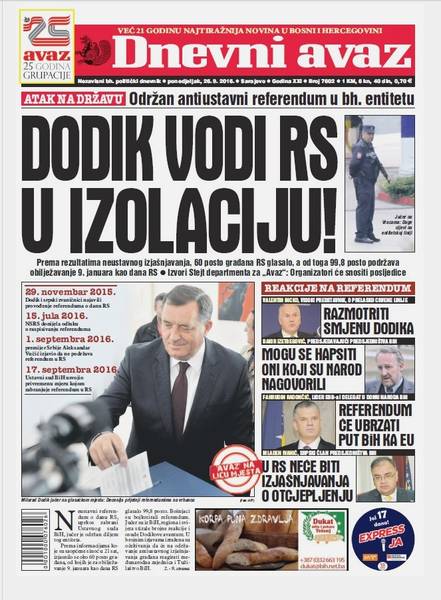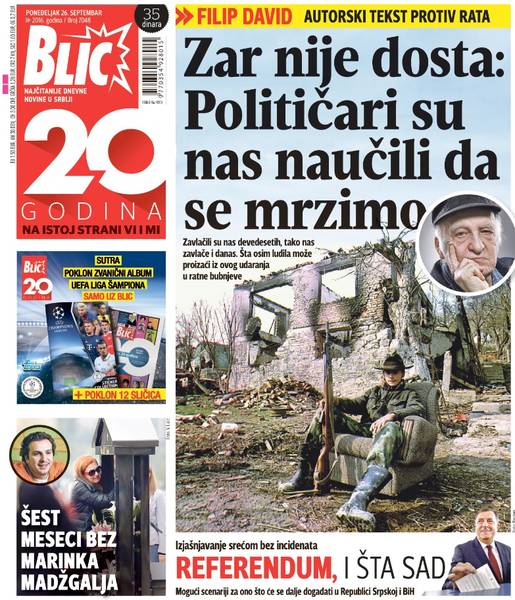Bosnia Has No Useful Move after the Referendum
Adelina Marini, September 26, 2016
 The referendum in Republika Srpska of Bosnia and Herzegovina is the leading subject in the countries of the former Yugoslavia’s press this morning. To some it was successful, while others see it as the beginning of many more problems. Most regional media quote the Bosnian newspaper Dnevni avaz, which reports that there is a massive diplomatic operation under way at the moment for the isolation of Milorad Dodik. According to the newspaper’s sources, key Western countries have initiated the operation, aiming to exert extra pressure and strengthening the opposition in RS, as well as pro-European powers throughout BiH. After refusing to comply with all the warnings not to go through with the illegal referendum, Dodik finds himself heavily offside, reports the newspaper.
The referendum in Republika Srpska of Bosnia and Herzegovina is the leading subject in the countries of the former Yugoslavia’s press this morning. To some it was successful, while others see it as the beginning of many more problems. Most regional media quote the Bosnian newspaper Dnevni avaz, which reports that there is a massive diplomatic operation under way at the moment for the isolation of Milorad Dodik. According to the newspaper’s sources, key Western countries have initiated the operation, aiming to exert extra pressure and strengthening the opposition in RS, as well as pro-European powers throughout BiH. After refusing to comply with all the warnings not to go through with the illegal referendum, Dodik finds himself heavily offside, reports the newspaper.
"Dodik disregarded some very clear warnings and signals, which gave him hints about how to walk out clean from the situation he had entangled himself in. The temporary ban of the Constitutional court of BiH was his last chance and we expected that he would honour at least that ruling and will postpone the referendum, thus opening the possibility for puling the national holidays law out of the dead end street. Now he may have scored an election point or two, but has lost a lot in the long term”, claims Avaz’s diplomatic source. This information was quoted en masse by Croatian media.
Ervin Mušinović writes in Klix today that going forward with the referendum is a failure of international politics and the legal system of the state. Authorities in Republika Srpska have by this referendum violated the Constitution of BiH, and thus the Dayton peace agreement itself. Institutions in BiH, as well as the international community appeared completely incapable of protecting the BiH Constitution, further undermining the citizens’ trust in BiH and the functioning of the state, writes the author. In his opinion, following yesterday’s referendum, BiH politicians are now completely aware of how weak the state’s institutions are, which by Constitution and law they are obligated to protect the constitutional legal order in the country.
"It is still unclear how the state of BiH and the international community arrived at a point where one of the presidents of an administrative territorial unit violates the highest legal code of the country and all the effort put in by the world powers into the Dayton peace agreement. Now all eyes are onto the Prosecutor General Goran Salihović, who is supposed to react, for disregarding the rulings of the Constitutional court is considered a criminal offence”, continues Mušinović in Klix.
The same newspaper quotes sociologist Slavo Kukić, according to whom the high representative for BiH has to destroy Milorad Dodik, or Milorad Dodik will destroy the country. “Dodik could have employed any scenario he wanted yesterday. On the other hand, it is important to ask how will the High Representative for BiH Valentin Inzko react, for this is about an attack against the Constitution and constitutional order in BiH. Besides, we are talking about a most blatant non-recognition of the state, and considering the High Representative is the protector of legal order, according to the Dayton peace agreement, one would expect him to yield all of his power, and not just against Dodik, but against the entire team, which carried out the referendum scenario”, believes Kukić.
Croatian Vecernji list reports that the Bosnian member of the presidency Bakir Izetbegović compared Dodik to Saddam Hussein, Qaddafi, and Milošević. "I think everything will depend heavily on the reaction of the international community. We have seen how Saddam Hussein, Qaddafi, and Milošević violate laws and how all of that ended. One can definitely not treat the USA, the EU, the Venice Commission, the Constitutional court, the Office of the High Representative, and the Peacekeeping Council in such a manner and expect it not to have consequences. The constitutional-legal structure of BiH will be protected and the international community will defend its authority”, said Izetbegović, quoted by the Croatian daily newspaper.
The same newspaper publishes an interview with the famous journalist and diplomat Zlatko Dizdarević, in which he says that there is no doubt that all of it was because of the pre-election campaign for the local elections next week, but the situation got out of the boundaries of the standard raising of tension. “This time the policy of division and breeding hostility and hatred, which has been going on for 20 years, now is much more severe and achieved results, which are now very close to a red line, which must not be crossed”, believes Mr Dizdarević. In his opinion, no one can help the country if it does not find the strength within and recognise its own interest in being emancipated as a state. Dizdarević claims that BiH is overestimating itself, viewing itself as an important factor for the  international community. “The world’s attention is now focused on the Middle East, and compared to that the Balkans are a true Disneyland”, he says.
international community. “The world’s attention is now focused on the Middle East, and compared to that the Balkans are a true Disneyland”, he says.
Regarding Russia, his opinion is that the country has returned to the world’s political scene and is not interested in any further destabilisation of the Balkans. “Of course they view Serbia and Republika Srpska as parts of its sphere of influence, but I do not believe Russia continues to undermine stability in the Balkans or BiH”, said the former diplomat to Vecernji.
Serbian Blic publishes an analysis by Deutsche Welle, in which the question is posed about whether tension remains after the referendum. According to Dragan Đukanović, Vice President of the Belgrade-based Centre for Foreign Policy, there will be no further escalation of tension, but in no way will it subside either. Political scientist Duško Radosavljević has no answer to the question what should the proper reaction of the international community be. At the moment, it is just as bad to pretend nothing happened, as this will be used for a new referendum, as is levying sanctions, for this would exacerbate the situation further too, he thinks. Dodik being punished by the High Representative is also not an option, for he has Moscow’s support.
"Should you do so, don’t tell me you expect Bakir Izetbegović to say he is sorry, and rather say that his policy won? Then in Mostar a Croatian leader will appear, who could say – there, see what they are doing in Bosnia, we should do the same as RS. This is why, I believe no move is beneficial enough”, is the opinion of political scientist Radosavljević. Most Serbian media report mainly the results of the referendum and there are few commentaries, but the subject is often on page one.
In the rest of the region there is less interest in the subject. Macedonian Dnevnik’s reaction is close to the ones of some Serbian media, choosing “War rhetoric subsides” for its headline. The newspaper claims that the referendum in Republika Srpska will not set fire to the Balkans.
Translated by Stanimir Stoev
 Bakir Izetbegovic, Andrej Plenkovic | © Council of the EU
Bakir Izetbegovic, Andrej Plenkovic | © Council of the EU Aleksandar Vucic, Recep Tayyip Erdogan | © Serbian Presidency
Aleksandar Vucic, Recep Tayyip Erdogan | © Serbian Presidency Jean-Claude Juncker, Zoran Zaev | © European Commission
Jean-Claude Juncker, Zoran Zaev | © European Commission